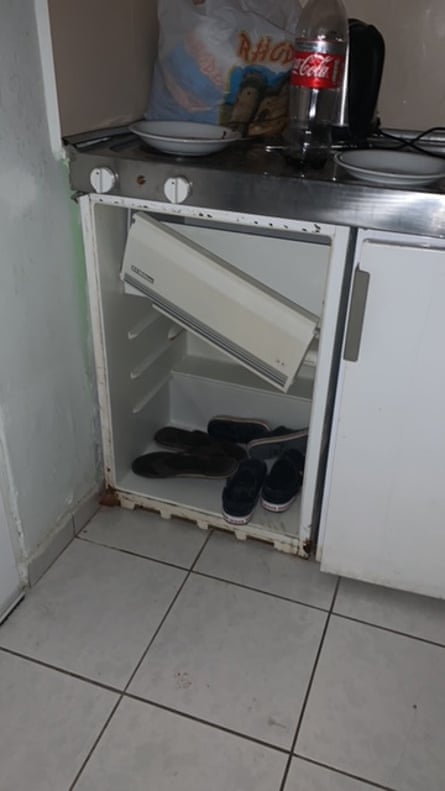Yulia Brill’s £4,500 package holiday on the Greek island of Rhodes turned into a nightmare on just the third day when her eight-year-old son felt unwell. He tested positive for Covid-19 and the family of four was moved from their five-star hotel to a room in a government quarantine hotel for 14 days.
“The hotel was on the flightpath to the island with planes flying metres overhead every eight minutes,” she said. “The room was filthy with dirt on all surfaces, lines of ants marching all over the floor among the hair of previous guests, and there were cockroaches in the bathroom. The drains were blocked and stank. There was no bottled water, cutlery or crockery.
“Food, which most of the time was inedible, was left unceremoniously at our door three times a day, the air conditioning barely worked, and the wifi came and went. When the wildfires were raging in Rhodes, all power went out. We could see flames on the hillsides as we sat in total darkness with no air-con or wifi.”
The family’s experience is the worst-case scenario for holidaymakers who are hoping for a sunshine break but then test positive for Covid-19 while abroad. British tourists can find themselves trapped in substandard conditions for 10 days or more.
A relaxation of UK travel rules last month prompted a surge in holiday bookings. However, while fully vaccinated arrivals from amber- and green-list countries no longer have to quarantine in the UK, anyone who tests positive while overseas must self-isolate for at least 10 days until they test negative, before being allowed to return home.
Several European destinations, such as Greece and Spain, may require infected travellers to relocate to government-appointed accommodation and some holidaymakers claim that they have been held in squalid conditions while still footing the bill for their resort hotel.
Under Greek rules, travellers who test positive can quarantine in their holiday hotel if it is four-star or above, or in a government-approved facility. The Brill family says they were not given the option to stay, nor did their tour operator, Tui, inform them about Greek quarantine requirements.
The 14-day period was reduced to 10 while the family was self-isolating in August, but they claim they only discovered this when they contacted the British consul after eight days in the room. “We were left to figure out and overcome every test, form and bureaucratic hurdle,” said Brill. “Tui didn’t even help us rebook our flights home.”
Tui says local authorities took the decision to move the family from the resort hotel. “We were very sorry to hear about the Brill family’s experience and understand how upsetting this must have been,” it says.
“While we had no control when Master Brill tested positive for Covid, and the family were communicated with directly under local regulations, our resort team remained in regular contact and did everything they could to help. We’d like to reassure our customers that their safety and well-being is always our highest priority.”
Covid cover, added to the Brills’ package, will reimburse them for their £1,500 expenses, including rebooked flights, PCR tests and taxis, but they are not entitled to a refund for the unused nights at their resort hotel. The cover, Holiday Promise, is included in all Tui packages with departure dates by 31 October.
Greek authorities pick up the bill for travellers’ quarantine accommodation, but holidaymakers in other countries have had to foot the costs themselves. Tourists in Spain claim they have been charged up to £2,000 for one room on top of hotel costs.
Asymptomatic Covid-19 cases may not realise that they are infected until they take a test required by the UK government three days before their return flight, meaning they have to extend their planned stay until given the all clear. (Transport secretary Grant Schapps announced on Friday that from 4 October fully vaccinated passengers will no longer need to take a pre-departure test when returning from non red-list countries.)
 One of the rooms the Brill family was forced to stay in, instead of the five-star hotel they had booked. Photograph: Brill Family
One of the rooms the Brill family was forced to stay in, instead of the five-star hotel they had booked. Photograph: Brill Family
If another member of the family later tests positive, the quarantine is extended by another 10 days and holidaymakers who miss their return flights have to rebook at their own cost. They also have to pay for a doctor to administer the required tests.
Travel insurance is even more important than usual for anyone travelling overseas in Covid times and comprehensive cover for a family of four starts at about £20.
It is vital that you check the small print for a company’s definition of Covid cover as this can vary wildly. Basic policies will only pay out for medical treatment and repatriation due to Covid, while more comprehensive ones will cover you if a positive test prevents you flying either to, or from, your holiday, plus accommodation costs if you have to self-isolate abroad.
Travellers are being urged to check the restrictions at their destination on the government website before booking a holiday. These are ever-changing and can vary region by region.
“If your pre-departure test is positive, you’ll need to follow the advice of the local authorities and you should advise your tour operator, who will offer support and advice,” says Sean Tipton of the travel association Abta.
“You’ll also need to contact your travel insurance provider to see what your policy entitles you to regarding covering any additional costs, such as extending your stay to cover the quarantine period, accommodation, further testing, rearranging your return journey and any medical treatment that might be required. Where insurance does not cover these costs then you will be required to cover these yourself.”



